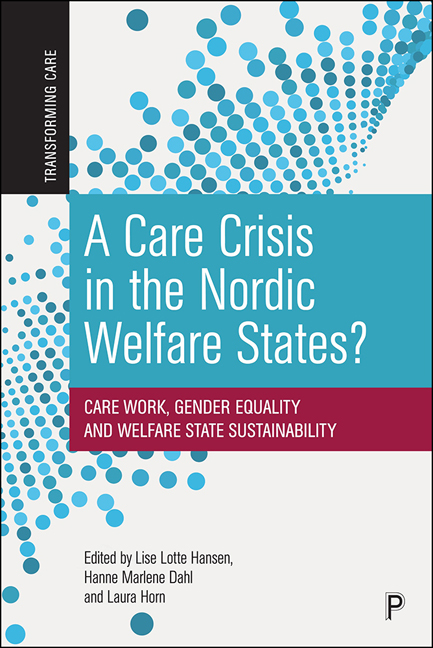 A Care Crisis in the Nordic Welfare States?
A Care Crisis in the Nordic Welfare States? Book contents
- Frontmatter
- Contents
- List of tables
- Notes on contributors
- Preface
- 1 Introduction: A care crisis in the Nordic welfare states?
- 2 The ‘care crisis’: its scientific framing and silences
- 3 Fraser’s care crisis theory meets the Nordic welfare societies
- 4 Crisis of care: a problem of economisation, of technologisation or of politics of care?
- 5 Deteriorating working conditions in elder care: an invisible crisis of care?
- 6 Managerialism as a failing response to the care crisis
- 7 ‘We are here for you’: the care crisis and the (un)learning of good nursing
- 8 Professionalisation of social pedagogues under managerial control: caring for children in a time of care crisis
- 9 Raising quality in Norwegian early childhood centres: (re)producing the care crisis?
- 10 Conclusion: Less caring and less gender-equal Nordic states
- 11 Postscript: A care crisis in the time of COVID-19
- Index
11 - Postscript: A care crisis in the time of COVID-19
Published online by Cambridge University Press: 13 May 2022
- Frontmatter
- Contents
- List of tables
- Notes on contributors
- Preface
- 1 Introduction: A care crisis in the Nordic welfare states?
- 2 The ‘care crisis’: its scientific framing and silences
- 3 Fraser’s care crisis theory meets the Nordic welfare societies
- 4 Crisis of care: a problem of economisation, of technologisation or of politics of care?
- 5 Deteriorating working conditions in elder care: an invisible crisis of care?
- 6 Managerialism as a failing response to the care crisis
- 7 ‘We are here for you’: the care crisis and the (un)learning of good nursing
- 8 Professionalisation of social pedagogues under managerial control: caring for children in a time of care crisis
- 9 Raising quality in Norwegian early childhood centres: (re)producing the care crisis?
- 10 Conclusion: Less caring and less gender-equal Nordic states
- 11 Postscript: A care crisis in the time of COVID-19
- Index
Summary
Care research does not take place in a vacuum, especially in the context of a global pandemic that has magnified the care crisis dynamics discussed in this book. Perhaps the COVID-19 crisis will actually give impetus to a more enduring, transformative restructuring of care and justice. And yet there is only limited room to reflect on these developments in the format of academic book chapters written mainly in the pre-COVID-19 period. How then can we make sure to position this book in its time, so that you, the reader engaging with our discussions, get a sense of the unsettling, disruptive context in which it has been finalised?
This postscript brings together a range of vignettes by some of the book's contributors on dimensions of COVID-19-related developments in their respective context. Taking the care crisis concept as reference point, each vignette describes a concrete moment, development or process that offers reflections on the discussions in the book within the COVID-19 context. Carsten Juul Jensen provides a glimpse from the perspective of a practitioner of care. Birgitte Ljunggren highlights the ambiguities of the impact of policy reactions to COVID-19, where unintended consequences have indeed shown what early childhood care could look like if there was sufficient political will. Carsten Juul Jensen's poetic rendering of an interview with a nurse volunteering for the COVID-19 unit conveys a feeling of how mundane and at the same time existential hospital care is, on so many levels. Finally, in a reflection on what it means to write and edit a book on the care crisis, Laura Horn highlights the disruptive context of academic work in the time of COVID-19.
When attentive compassionate care becomes dangerous
Carsten Juul Jensen
The man in the bed is skinny and marked by advanced Kaposi's sarcoma. He only has a few days left to live. Arms, head and neck on the man in the bed are covered by the large brown stains that are characteristic of this type of cancer. Sometimes he cries. No one knows if it's of pain or sorrow. Two women are silently doing their job in the naked room where the windows are never opened and where the only exit is a sluice room into the yard. It's an older nurse and a younger nurse.
- Type
- Chapter
- Information
- A Care Crisis in the Nordic Welfare States?Care Work, Gender Equality and Welfare State Sustainability, pp. 190 - 199Publisher: Bristol University PressPrint publication year: 2021
